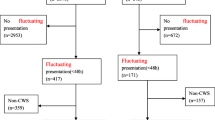Abstract
Introduction: Capsular warning syndrome (CWS) carries a significant risk of permanent stroke. There are no proven therapies for preventing completed stroke in this unstable situation.
Methods: Clinical observation in two patients with aspirin-resistant CWS treated with a loading dose of oral clopidogrel.
Results: Both patients had excellent neurological outcome, although one sustained an asymptomatic brain infarction.
Conclusion: High-dose oral clopidogrel plus aspirin merits formal evaluation in high-risk transient brain ischemia such as CWS, preferably in a randomized trial compared to aspirin alone.
Similar content being viewed by others
References
Donnan GA, O’Malley HM, Quang L, Hurley S, Bladin PF. The capsular warning syndrome. Pathogenesis and clinical features. Neurology 1993;43:957–962.
Staaf G, Geijer B, Lindgren A, Norrving B. Diffusion-weighted MRI findings in patients with capsular warning syndrome. Cerebrovasc Dis 2004;17:1–8.
Benito-León J, Alvarez-Linerá J, Porta-Etessam J. Detection of acute pontine infarction by diffusion-weighted MRI in capsular warning syndrome. Cerebrovasc Dis 2001;11:350,351.
Farrar J, Donnan GA. Capsular warning syndrome preceding pontine infarction. Stroke 1993;24:762.
Donnan GA, O’Malley HM, Quang L, Hurley S. The Capsular warning syndrome: The high risk of early stroke. Cerebrovasc Dis 1996;6:202–207.
Dobkin BH. Heparin for lacunar stroke in progression. Stroke 1983;14:421–423.
Lalive PH, Mayor I, Sztajzel R. The role of blood pressure in lacunar strokes preceded by TIAs. Cerebrovasc Dis 2003;16:88–90.
CAPRIE Steering Committee. A randomised, blinded, trial of clopidogrel versus aspirin in patients at risk of ischaemic events (CAPRIE). Lancet 1996;348:1329–1339.
Yusuf S, Zhao F, Mehta SR, et al. Effects of clopidogrel in addition to aspirin in patients with acute coronary syndromes without ST-segment elevation. N Engl J Med 2001;345:494–502.
Savcic M, Hauert J, Bachmann F. Clopidogrel loading dose regimens: kinetic profile of pharmacodynamic response in healthy subjects. Semin Thromb Hemost 1999;25:15–19.
Thebault JJ, Kieffer G, Cariou R. Single-dose pharmacodynamics of clopidogrel. Semin Thromb Hemost 1999;25:3–8.
Frey J. Capsular warning syndrome. Neurology 1994;44(1):195,196.
Batista P, Soares F, Oliveira V, Ferro JM. No evidence for microembolism in clustering transient ischemic attacks. Cerebrovasc Dis 2002;14(3–4)260.
Terai S, Hori T, Miake S, Tamaki K, Saishoji A. Mechanism in progressive lacunar infarction: a case report with magnetic resonance imaging. Arch Neurol 2000;57:255–258.
Author information
Authors and Affiliations
Corresponding author
Rights and permissions
About this article
Cite this article
Fahey, C.D., Alberts, M.J. & Bernstein, R.A. Oral clopidogrel load in aspirin-resistant capsular warning syndrome. Neurocrit Care 2, 183–184 (2005). https://doi.org/10.1385/NCC:2:2:183
Issue Date:
DOI: https://doi.org/10.1385/NCC:2:2:183




